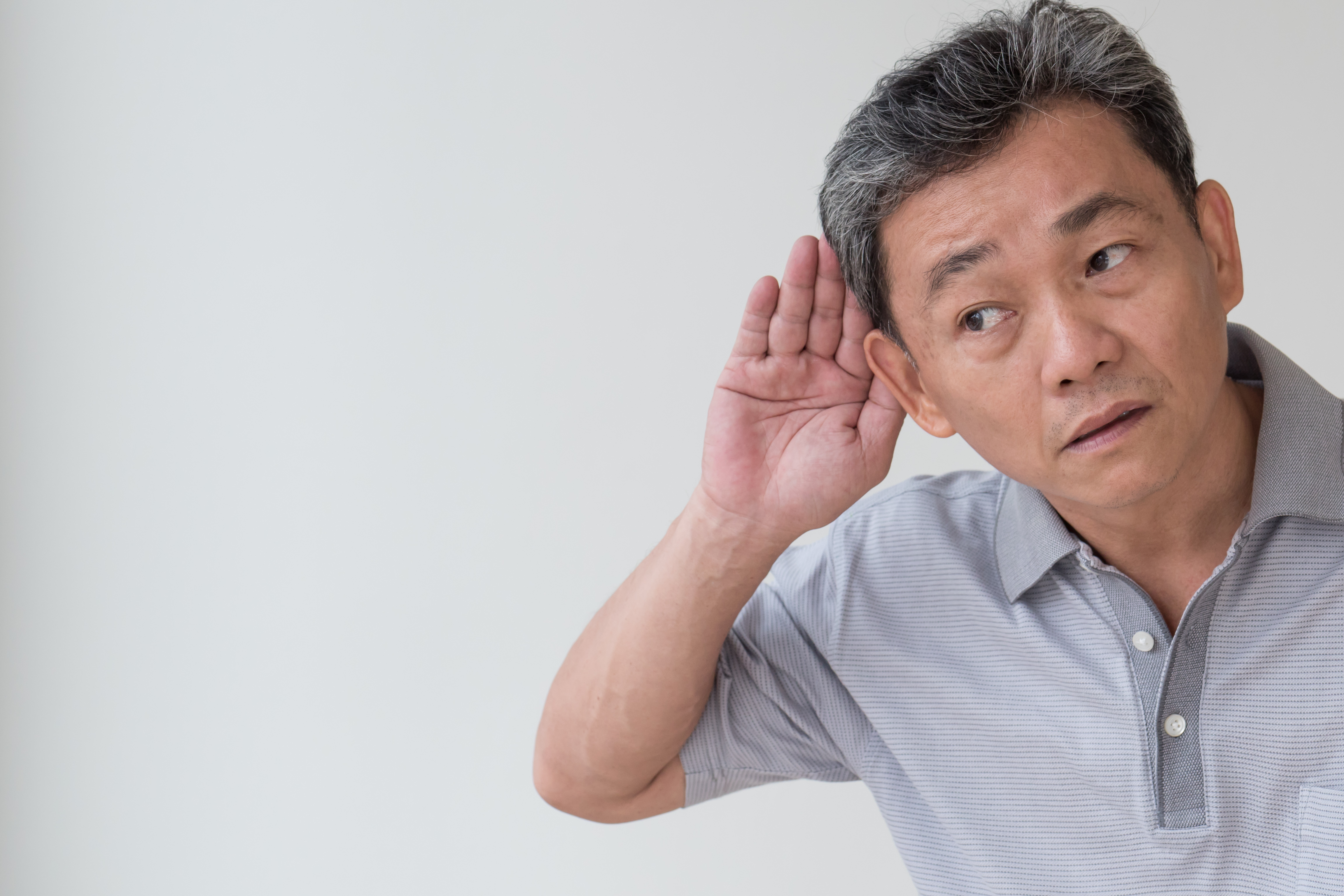8 early warning signs of hearing loss you should never ignore
Feeling concerned that you or someone you love may be experiencing hearing loss? Here are eight warning signs that may signal it's time to seek help...


If you're concerned about your hearing, or that of a loved one, then this list of eight early warning signs of hearing loss is designed to help you figure out if it could be time to seek assistance.
While hearing loss can sometimes be sudden, more often than not it happens slowly with many people experiencing the warning signs of hearing loss for up to seven years before they seek treatment.
Hearing loss that occurs gradually as you age is common, with close to 50% of people in the US over the age of 60 having some degree of hearing loss. However, chronic exposure to loud noises - either through work or recreation - means that hearing loss is also beginning to affect younger people, with the World Health Organization (WHO) estimating that 1.1 billion young people globally are at risk of permanent and avoidable hearing loss.
There are steps you can take to help protect your hearing and reduce your risk of hearing loss, but once you start experiencing symptoms, most types of hearing loss can’t be reversed. The good news is that recognizing the warning signs of hearing loss and seeking help early can help protect you against the feelings of isolation often experienced by those with hearing issues, and ensure you’re still able to enjoy all the activities that you love.
So if you recognize any of the below signs of hearing loss in yourself or a loved one, take action. Consult a healthcare professional, such as your primary health provider, otolaryngologist, audiologist or a hearing instrument specialist.
1. Experiencing ringing or buzzing in the ears
Hearing noises that are not caused by sounds coming from the outside world is symptomatic of a condition called tinnitus. Often described as a ringing in the ears, tinnitus may also manifest itself in other forms of sound, such as buzzing, hissing, or clicking.
While tinnitus itself doesn’t cause hearing loss, it may be one of the first symptoms of inner ear damage, which is why paying attention to it is so important.
Start your week with achievable workout ideas, health tips and wellbeing advice in your inbox.
The Centers for Disease Control and Prevention (CDC) estimates that nearly 15% of the US population - over 50 million people - suffer from this potentially debilitating health condition, making it one of the most common in the country.
Both age-related hearing loss and noise-induced hearing loss can cause tinnitus, and while it can sometimes be the result of a temporary cause, such as an inner ear infection or build-up of wax, long-term tinnitus is often the brain’s way of filling in the missing frequencies that it’s no longer receiving from the auditory system.
“Tinnitus can appear out of the blue, be independent of hearing loss, or can come hand in hand with a hearing loss,” explains Matthew Allsop, Partner and Operations Director at Harley Street Hearing. “If it appears in one ear, follows your pulse, affects your sleep, or worries and concerns you, then it’s worth a visit to a healthcare professional to have it investigated.”
2. Missing common sounds
Has it been a while since you’ve heard birds singing? Are you finding yourself sleeping through your alarm? Do you struggle to hear text messages coming through or your phone ringing?
All of these sounds are high pitched and register at frequencies of 2,000 Hz or above, which those with hearing loss may no longer be able to pick up.
“If the world seems like a quieter place than it used to be, this may be because of your ears,” says Allsop. High-frequency hearing loss is one of the most common types of hearing loss, which makes high-pitched sounds difficult to hear. It can occur in anyone but is most often found in people with age-related hearing loss or those who have been exposed to loud noise.
In addition to being unable to hear common sounds, symptoms of high-frequency hearing loss include struggling to understand women’s and children’s voices and feeling like you can hear people but not understand what they’re saying.
3. You have your devices at maximum volume
Struggling to hear your favorite TV show may be an early warning sign of hearing loss. “One of the first things that people tend to notice with a hearing loss is that the television volume needs turning up louder than is comfortable or necessary for those around them to hear effectively,” says Allsop.
So, if you’ve been cranking up the volume on your TV or phone to make the sound clearer and other people are complaining it’s too loud, you may be suffering from sensorineural hearing loss (SNHL).
Caused by damage to the inner ear or your auditory nerve, SNHL is the most common type of hearing loss, affecting around 90% of those who have hearing difficulties. Influencing both how loudly and how clearly you perceive sound, it is usually gradual, reducing your ability to hear slowly over time.
“If you’re at a friend’s or family member’s house and they have the TV set to a level which is comfortable for them, however it’s hard for you to hear, this could be a sign your hearing is deteriorating,” Allsop explains.
While sensorineural hearing loss can’t be reversed, properly fitted hearing aids can help.
4. Heavy reliance on lip reading
Watching people’s lips instead of making eye contact is an early warning sign of hearing loss. When one sense doesn’t work as well as it used to, the brain will often try to make up for this by using more of the other senses.
“Even with normal hearing, communication as a whole is made up of three key areas: hearing, vision, and context,” explains Allsop. “If one of those is compromised then we rely more heavily on the other two. If our hearing isn’t working then visual cues and contextual cues (i.e. the cues within a sentence) become more important.”

People with hearing loss can often ‘see’ the sound of a letter or word even though they can’t hear it, leading them to shift their eyes to a person’s mouth rather than looking at them directly. Many people with hearing difficulties can get away with doing this for a long time, but the recent coronavirus pandemic has caused more people to seek help (as we reported in our article on the link between Covid-19 and hearing loss).
“Only when one of the other cues is taken away, such as in the current situation with everyone wearing face masks, does one really realize how hard it can be to hear,” says Allsop. “We’ve had an upsurge in new patients coming through the doors over the last 12 months who have realized that their ears aren’t working as well as they thought now that everyone is wearing facemasks and they can’t fill in the gaps with the extra visual assistance.”
5. Misunderstanding what people are saying
Many people with hearing loss report feeling frustrated, explaining to health care professionals that while they can hear what’s being said, they can’t understand it. This is usually the result of high-frequency hearing loss, also known as sloping hearing loss.
If you have sloping hearing loss, you can probably clearly hear low-pitched sounds below 1000 Hz but may struggle to hear high-pitched sounds above 1000 Hz. Vowel sounds from the letters A, E, I, O, and U are all low-pitched, while consonant sounds like S, F, Th, Sh, V, K, and P are high-pitched, making it hard to differentiate between words such as “show” and “throw”.
“Typically with an age-related hearing loss, also known as presbyacusis, we maintain our ability to hear low tones. However, it’s the higher tones or pitches that we start to struggle to hear,” explains Allsop. “They tend to be the sounds associated with clarity, detail and distinction, and can result in words being mixed up when it comes to hearing.”
6. Background noise makes it harder to hear
Do you feel like you can just about follow a conversation in a quiet environment but lose all ability to understand what’s being said when background noise is present?
High-frequency hearing loss can make understanding speech almost impossible when words are having to compete with other sounds. That’s because the kind of background noise present in a shopping mall or restaurant is low-pitched while many letters in speech are high-pitched.
In these situations, the ears become distracted by sounds in the background that are easier to hear than the words being spoken in a conversation. Hearing aids that offer frequency-lowering technology may be able to help, so it’s worth speaking to an audiologist who can help you find the right frequency for your hearing loss needs.
7. You’re exhausted after social events
If you find yourself fatigued at the end of a social event, it could be that you have hearing loss. When you can’t hear all the sounds of speech, your brain has to step in and work overtime to fill in the gaps. This involves huge amounts of focus, which can leave you feeling exhausted and drained when you’re around other people.
“Any degree of hearing loss, from mild all the way to profound, means that the filters in the ear don’t function well,” Allsop explains. “As a result, the ear sends everything through to the brain for interpretation, rather than specific information. This means that the brain has to try and filter through everything to hear what you want to hear. This takes concentration and concentration takes energy.”
Frequent headaches, wanting to nap more often, or finding yourself zoning out of conversations are common signs of concentration fatigue that can accompany hearing issues. Alongside seeking professional help, it can be a good idea to open up to those around you about what you’re experiencing, and to make sure you have access to quiet spaces when you need them.
8. Reluctance to spend time with other people
As hearing becomes challenging, many people will begin to avoid situations where interaction is key, instead choosing to withdraw and isolate themselves.
According to a study of hearing-impaired individuals over the age of 50, people with untreated hearing loss are more likely to report anxiety and depression and less likely to participate in social activities compared to those who wore hearing aids.
“If it’s really tiring to go to social events, or you’re constantly worried about having to ask people to repeat themselves and you feel embarrassed, then it’s common to become less socially active,” says Allsop.
He adds that seeking help early is key to helping make life enjoyable again. “All of the above signs can be significantly helped by wearing hearing aids. It’s better to identify and manage a hearing loss as soon as you suspect that you have a hearing impairment.”
Kathryn is a freelance health and wellness writer. She previously worked for 10 years as an educator in the health care industry before leaving to spend her days indulging her love of writing. An avid meditator and long-distance walker with a passion for mental and emotional wellbeing, she’s happiest when she’s surrounded by mountains and oceans. When not writing words or thinking about them while walking, she can usually be found brewing a cup of herbal tea from her vast collection or trying to figure out healthy ways of incorporating chocolate and peanut butter into almost every meal.


